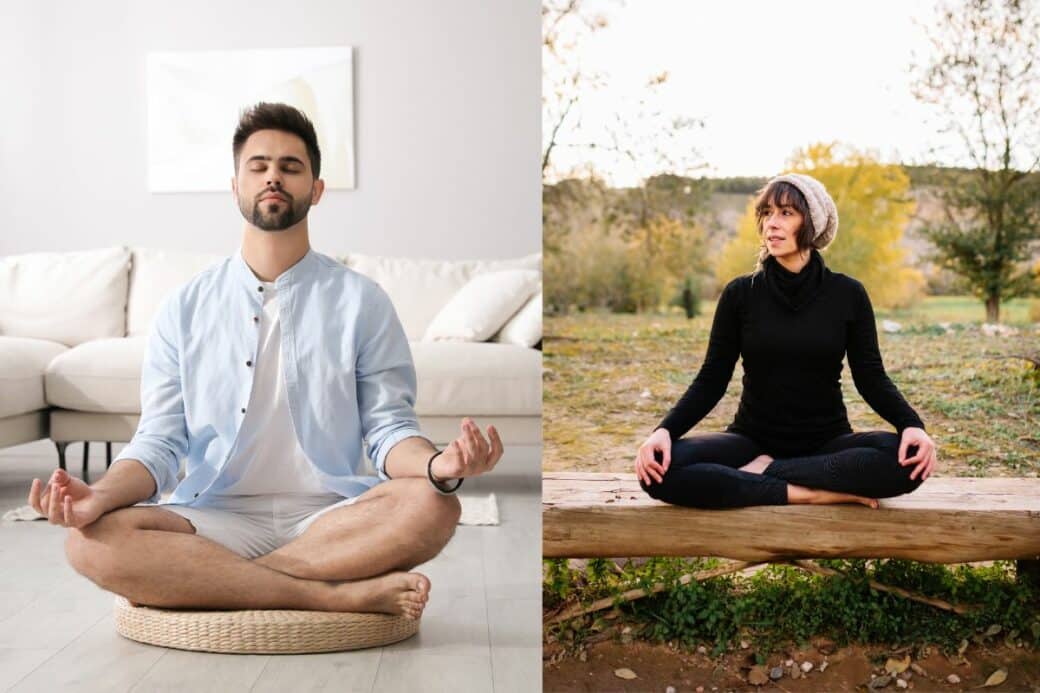Imagine a world where we could recharge and rejuvenate our minds every night, without the need for sleep. While a good night’s rest is essential for our overall well-being, the practice of meditation offers a compelling alternative. As we explore the fascinating battle between meditation and sleep, we delve into the benefits and differences of these two modes of relaxation. So, whether you find solace in the peaceful depths of meditation or the blissful embrace of slumber, get ready to discover which path truly leads to tranquility.
Physical Health Benefits

Meditation Vs Sleep: Decreases blood pressure
One of the key benefits of both meditation and sleep is their ability to lower blood pressure. Engaging in regular meditation or getting enough sleep can help reduce high blood pressure, which in turn can lower the risk of heart disease and stroke. Both activities promote relaxation and stress reduction, allowing your body to find a healthy balance.

Boosts immune system
Taking care of your physical health is essential, and both meditation and sleep play a crucial role in boosting your immune system. Regular meditation practices have been shown to increase the activity of natural killer cells, which are responsible for fighting off viruses and tumors. Adequate sleep, on the other hand, helps strengthen the immune system, enabling your body to better combat infections and diseases.
Reduces chronic pain
Chronic pain can significantly impact your quality of life, making it essential to find effective ways to manage it. Both meditation and sleep offer relief from chronic pain. Meditation helps increase your pain tolerance, reduces the intensity of pain sensations, and improves your overall pain coping mechanisms. Likewise, getting enough sleep allows your body to heal and repair, reducing inflammation and alleviating chronic pain symptoms.
Mental Health Benefits
Reduces stress and anxiety
Living in a fast-paced and demanding world can lead to high levels of stress and anxiety. Both meditation and sleep provide an effective escape from the pressures of daily life. Meditation helps activate the relaxation response, reducing the production of stress hormones and promoting a sense of calmness and inner peace. Similarly, quality sleep allows your mind and body to rest and recharge, reducing anxiety and improving your ability to cope with stress.
Improves mood and emotional well-being
Attaining a positive mood and emotional well-being is crucial for leading a fulfilling life. Engaging in regular meditation and getting sufficient sleep can help improve your mood and overall emotional well-being. Meditation encourages a greater sense of self-awareness, allowing you to identify and manage negative emotions effectively. Adequate sleep, on the other hand, helps regulate emotions, making you less prone to mood swings and irritability.
Enhances cognitive function
The power of a clear and sharp mind cannot be underestimated. Both meditation and sleep are known to enhance cognitive function, improving your ability to think, learn, and remember. Meditation practices, such as mindfulness, can enhance attention and concentration, while also promoting creative thinking and problem-solving skills. Quality sleep, particularly during the deep REM stage, helps consolidate memories, improve decision-making abilities, and increase overall cognitive performance.
Duration
Meditation: Flexible duration
The beauty of meditation lies in its flexibility. Whether you have a few minutes or an hour to spare, you can still experience its benefits. Meditation can be practiced for as little as five minutes a day, allowing you to gradually increase the duration as you become more comfortable. This adaptability makes it accessible to anyone, regardless of how busy their schedule may be.
Sleep: Fixed duration
Unlike meditation, sleep requires a fixed duration to ensure your body receives the rest it needs. The National Sleep Foundation recommends that adults aim for seven to nine hours of sleep each night for optimal physical and mental health. While it may be tempting to sacrifice sleep for other activities, obtaining the recommended amount is crucial in order to reap the full benefits sleep has to offer.
Methods and Techniques
Meditation: Mindfulness, transcendental, loving-kindness
When it comes to meditation, there are various methods and techniques you can explore. Mindfulness meditation involves focusing your attention on the present moment without judgment, helping you cultivate a sense of awareness and acceptance. Transcendental meditation, on the other hand, involves the use of a mantra, which helps quiet the mind and induce a state of deep relaxation. Loving-kindness meditation focuses on cultivating feelings of compassion and love towards oneself and others.
Sleep: REM and non-REM stages
Sleep consists of different stages, each serving a specific purpose. Rapid Eye Movement (REM) sleep is the stage associated with dreaming and memory consolidation. It is during this stage that your brain is most active, helping process emotions and create new neuronal connections. Non-REM sleep, on the other hand, can be divided into three stages, each essential for bodily restoration and repair. Together, REM and non-REM stages work synergistically to ensure your body and mind receive the rest they need.
Purpose
Meditation: Conscious awareness and mental clarity
The primary purpose of meditation is to cultivate conscious awareness and mental clarity. Through regular practice, meditation allows you to become more attuned to your thoughts, emotions, and bodily sensations. It helps you develop a non-judgmental perspective, enhancing your ability to stay present and focused. Ultimately, meditation aims to create a deeper connection between your mind and body, leading to improved overall well-being.
Sleep: Physical and mental restoration
Sleep serves as a vital period of physical and mental restoration. During sleep, your body undergoes essential processes such as tissue repair, hormonal regulation, and immune system strengthening. Sleep also plays a crucial role in consolidating memories, facilitating learning, and supporting overall brain health. Without sufficient sleep, your physical and mental well-being can suffer, impairing your ability to function at your best.
Brain Activity
Meditation: Increased alpha and theta waves
Research has shown that meditation can alter brain wave patterns, particularly increasing the production of alpha and theta waves. Alpha waves are associated with a relaxed and wakeful state of mind, while theta waves are present during periods of deep relaxation and meditation. These altered brain waves coincide with a sense of calmness, heightened focus, and increased creativity.
Sleep: Varied brain wave patterns
During different stages of sleep, your brain produces distinct brain wave patterns. In the REM stage, which is associated with dreaming, your brain exhibits high-frequency brain waves similar to those during wakefulness. In contrast, non-REM sleep is characterized by slower brain wave patterns, including delta waves during the deepest stage of sleep. These varied brain wave patterns during sleep reflect the different processes your brain undergoes to support physical restoration and cognitive function.
Consciousness
Meditation: Heightened state of consciousness
Meditation allows you to enter a heightened state of consciousness. By intentionally focusing your awareness and quieting the mind, meditation enables you to transcend ordinary thinking patterns and tap into a deeper level of awareness. This expanded state of consciousness can lead to profound insights, inner peace, and a greater connection with yourself and the world around you.
Sleep: Altered states of consciousness
Sleep introduces you to altered states of consciousness, distinct from your waking state. These altered states, experienced during dreaming and deep sleep, provide an opportunity for your mind to process emotions, create vivid imagery, and integrate daily experiences. While sleep may not offer the same level of awareness as meditation, it allows for unique mental experiences that contribute to overall well-being.
Restfulness
Meditation: Restful wakefulness
Meditation offers restful wakefulness – a state where your mind is alert and awake, yet deeply relaxed. During meditation, your body experiences a state of rest comparable to sleep, but with the added benefit of heightened mental awareness. This restful wakefulness allows for rejuvenation and renewal, providing a sense of calmness and clarity that can positively impact your physical and mental health.
Sleep: Natural rejuvenation
Sleep is nature’s way of providing natural rejuvenation. It allows your body and mind to recharge, repairing any damage and preparing you for the challenges of the day ahead. Deep sleep stages are particularly crucial for physical restoration, as growth hormone release and cellular repair are at their highest during this time. Natural rejuvenation through sleep ensures that you wake up feeling refreshed, energized, and ready to take on the world.
Practicality
Meditation: Can be done anywhere, anytime
One of the greatest advantages of meditation is its flexibility and practicality. Whether you’re at home, work, or on the go, you can engage in meditation anywhere and anytime. All you need is a quiet space and a few minutes to focus on your breath, a mantra, or a specific meditation technique. This accessibility makes meditation an ideal practice for incorporating into your daily routine, regardless of your lifestyle or commitments.
Sleep: Requires specific environment and time
Unlike meditation, sleep requires specific conditions for optimal restfulness. Creating a sleep-friendly environment involves ensuring a comfortable and dark room, minimizing noise and distractions, and establishing a consistent sleep schedule. It is important to allocate sufficient time for sleep, allowing yourself to enter into the different stages necessary for optimal physical and mental restoration. While it may require some adjustments and prioritization, creating the right sleep environment is essential for reaping the benefits of a good night’s rest.
Potential Side Effects
Meditation: Rare and minimal side effects
In general, meditation is considered safe for most individuals and has minimal side effects. However, it is important to note that in some cases, individuals may experience temporary feelings of frustration, irritability, or emotional discomfort during meditation. These side effects are generally rare and mild, and they often occur when individuals are first starting their meditation practice or pushing themselves too hard. With proper guidance and gradual progress, any potential side effects can be effectively managed.
Sleep: Insomnia, sleep disorders
While sleep itself is a natural and essential function, disturbances in sleep can lead to various sleep disorders. Insomnia, in particular, is a common sleep disorder that affects many individuals. It can manifest as difficulty falling asleep, staying asleep, or experiencing non-restorative sleep. Insomnia can have a significant impact on overall well-being, leading to daytime sleepiness, mood disturbances, and impaired cognitive function. Identifying and addressing the underlying causes of sleep disorders is essential for achieving restful and restorative sleep.
In conclusion, both meditation and sleep offer numerous physical and mental health benefits. While meditation provides flexibility, mindfulness, and a heightened state of consciousness, sleep serves as a fixed duration period of physical and mental restoration. By incorporating both practices into your daily routine, you can experience improved blood pressure, boosted immune system, reduced chronic pain, decreased stress and anxiety, enhanced mood and emotional well-being, improved cognitive function, and overall rejuvenation. Whether you choose to meditate or ensure sufficient sleep, prioritizing your well-being will undoubtedly have positive effects on your quality of life.




